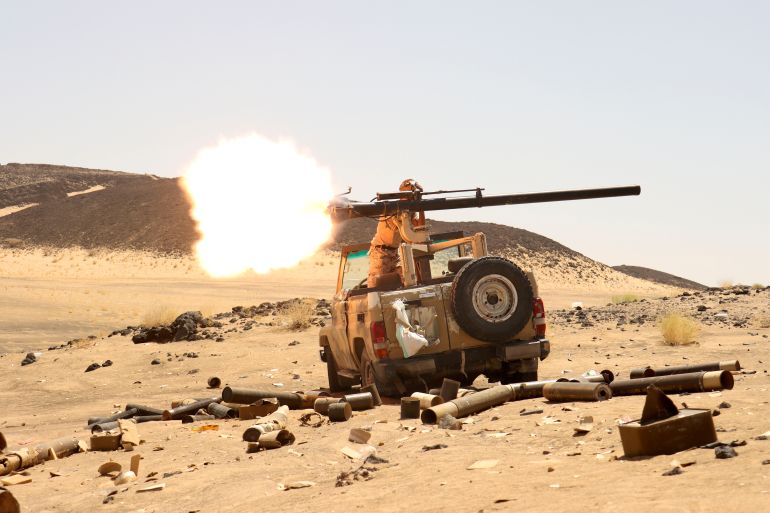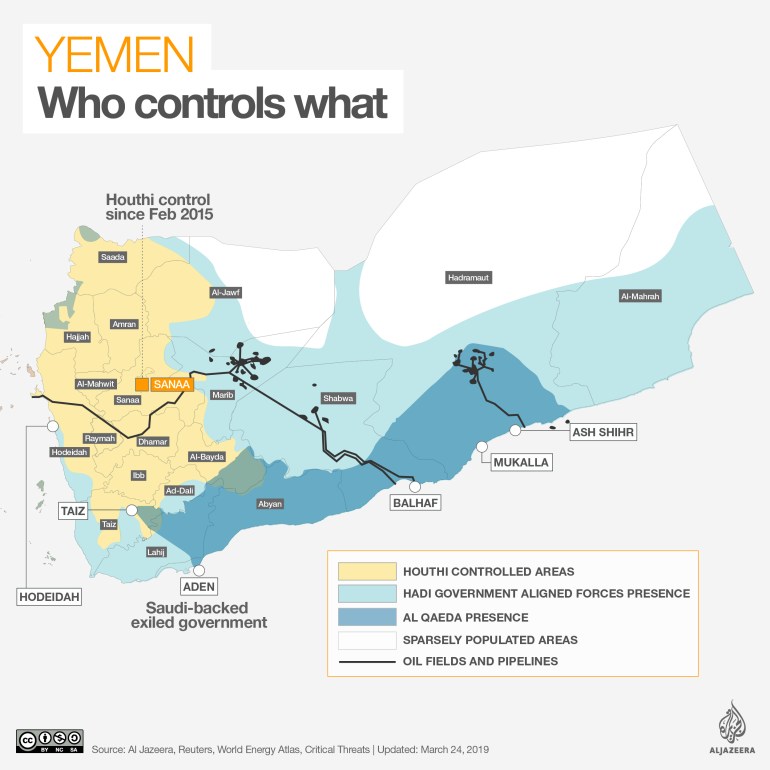UN accused of turning a blind eye to Yemen abuses
Yemen activists denounce the United Nations and its former envoy Martin Griffiths for ignoring rights breaches and putting ‘politics before humanity’.

Human rights advocates from southern Yemen have accused the United Nations of turning a blind eye to human rights violations committed in areas under government control at the hands of what they described as “terrorist” groups.
Human rights lawyers also criticised the UN and its former envoy to Yemen, Martin Griffiths, for his “piecemeal” approach to the conflict and for putting “politics before humanity” – a negotiating strategy that has led to a complete failure of the peace process, they said.
Keep reading
list of 4 items16 million Yemenis ‘marching towards starvation’: UN food agency
Yemen rebels say nine executed over political leader’s killing
Yemeni government forces again on the backfoot
“The government of Yemen is using violence against its citizens in Shabwa, including targeted assassinations with the help of agents from extremist and terrorist groups,” said Nasr Obaid, a human rights activist with the Southern Independent Group, an NGO representing southern Yemenis.
Speaking on the sidelines of the Human Rights Council last week in the Swiss city of Geneva, Obaid said Yemeni citizens who collaborated with the Shabwani Elite Forces, a UAE-backed militia that fought al-Qaeda alongside the tribes in the south, are now victims of government reprisals.
Some 55 assassinations and more than 600 arbitrary arrests have been reported in the southern governorate of Shabwah since the Saudi-backed government of President Abd Rabbu Mansour Hadi took control of the region, according to Frontline, a Yemeni NGO. But UN reports fail to acknowledge the increase in violations taking place in the south of the war-torn country, Obaid said.
‘Committing heinous crimes’
Presenting a documentary film on the human rights situation in Shabwah, Obaid said summary executions are committed in broad daylight by government officers, as well as agents of Al Islah, the Muslim Brotherhood in Yemen, and other hardline groups.
“These extremists come from the north of the country and from Marib,” said Obaid. “The southern tribes have been fighting them all along, but they commit heinous crimes to punish all those that refuse to collaborate with them.”
Obaid and other activists claimed the central government is using armed groups against tribal leaders, human rights advocates, and political adversaries in Shabwah and the southern provinces in order to curb dissent.
The Yemeni government mission to the UN in Geneva did not answer Al Jazeera’s requests for comment. The office of the UN special envoy to Yemen did not respond by the time of publication.
Al-Qaeda and Shabwah
Shabwah is one of Yemen’s oil-rich governorates and during the outbreak of the Yemeni civil war in 2015 became the battleground between the Houthi rebels and late President Ali Abdullah Saleh loyalists on one side and the internationally recognised government of President Hadi on the other.
In 2017, government loyalists and the Saudi led-coalition pushed the Houthis out of the region. But ever since, Shabwah has been the theatre of a prolonged armed uprising campaign by al-Qaeda in the Arabian Peninsula (AQAP), as well as a power struggle between the Hadi government and the secessionist Southern Transitional Council, which considers itself the only legitimate representative of the southern people.
During the same period, the UAE’s increasing involvement in “counterterrorism” operations alongside the Shabwani Elite Forces and the United States in the south has upset the tribes, adding to the tensions between local and central authorities.
A UN report issued in September says there are no clean hands in Shabwah.
The 60-page document said the governments of Yemen, Saudi Arabia, the United Arab Emirates (UAE), the Southern Transitional Council, as well as the Houthis, referred to as the “de facto authorities”, are all responsible for human rights violations and individuals belonging to these parties “have committed acts that may amount to war crimes”.
Ardi Imseis, one of the UN legal experts compiling the report, told Al Jazeera the government of Yemen and Saudi Arabia continue to impede UN lawyers’ access to the country.
“Only the Houthis have agreed to our field visits, but we cannot go unless Saudi Arabia and the government of Yemen allow us to do so,” said Imseis.
Saleh Alnoud, a lawyer in international humanitarian law, said the government needs to do more for the people of Shabwah.
“It is difficult to know who controls what in Yemen, but the central government is formally in charge of Shabwah and should be held responsible for the lack of security and services over there,” Alnoud told a media briefing.

UN envoy criticised
The deteriorating human rights situation in Shabwah is also the result of a flawed approach to the peace process by the UN and its envoys, which have ignored the instances of the southern regions, Alnoud said.
“The former envoy has allowed the two parties (government and Houthis) to manoeuvre and dominate the agenda as much as they wanted, especially the Houthis,” said Alnoud.
“The government of President Hadi has no legitimacy in the south of Yemen … The new UN envoy (Hans Grundberg) should acknowledge the realities on the ground head-on. There has to be a different approach.”
The UN approach to the conflict acknowledges only two belligerent sides: the Houthis who occupy the capital Sanaa and the north of the country; and the internationally recognised government. Some experts argue this two-party framework is ignoring the realities on the ground in Yemen, including the complexity of its tribal set-up as well as the longstanding southern struggle for independence.
A solution would be to replace Security Council Resolution 2216 and widen the spectrum of political, ethnic, and gender representation at the negotiating table, analysts have said.
Battle for Marib
Activists, however, worried that with the Houthis laying siege to the oil-rich city of Marib, the last northern stronghold of the central government, human rights conditions may deteriorate and violations go unreported.
Marib, 120km (70 miles) east of the capital Sanaa, lays at a strategic junction the north and south of Yemen. It is not only key to controlling the northern regions, but its capture may lead to the conquest of other territories in Shabwa and the rest of the south.
David Beasley, chief of the World Food Programme, said last month more than half the nation of 30 million urgently needs food assistance.
“We’re literally looking at 16 million people marching towards starvation,” he said.
The Office of the High Commissioner for Human Rights issued a statement listing many violations committed by different actors in September.
The Houthis, also known as Ansar Allah, publicly executed nine men, including one who reportedly was a minor when he was detained.
In Aqabat al-Qanda’ in Shabwa governorate, an air attack launched by the Saudi-led coalition hit a pick-up vehicle, killing five members of a family, among them two children. None of those killed was a member of an armed group.
In another incident, a young man was robbed and shot dead at a checkpoint set up by a unit affiliated with the Southern Transitional Council in Lahj governorate.